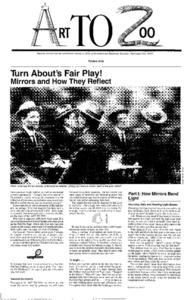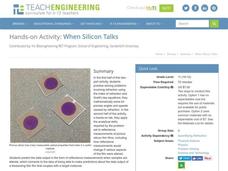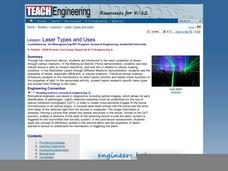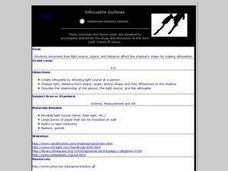Curated OER
Mirrors and How They Reflect
Learners experiment with mirrors. In this Mirrors and How They reflect lesson, students read how mirrors reflect light. Then learners perform over ten experiments and record their conclusions about mirrors and reflection. Students create...
Curated OER
Print-Making Card Designs
Students explore print making. In this art and print making lesson, students listen to biographical information about Leonardo da Vinci, then define "mirror image" as a technique used by this artist. Students cut out magazine pictures...
Curated OER
Manifest Destiny
Students explore the concept of Manifest Destiny. In this Westward Expansion lesson, students discuss the impact of Manifest Destiny on different groups of people who inhabited the West. Students create journals about the topic.
Curated OER
Charlotte's Web
Fourth graders focus on fluency by reading the book Charlotte's Web. In this reading strategies lesson, 4th graders partner read, do guided reading, and independent reading to increase fluency. Students use Venn Diagrams, discuss cause...
Curated OER
All The News
Students simulate newspaper critics in the topics of heat and temperature. They write a scientific critique of evidence and claims used in a newspaper article and research using KIE software. They write notes on the letter to the editor...
Curated OER
The Connection Between Pigment and Light Colors
Students explain the mole concept and use this concept to prepare chemical solutions of particular molarities.
Curated OER
Migrating Monarchs and Trekking Timber wolves on the Internet
Pupils learn and observe the life cycle of a monarch butterfly. They explore how wolves maintain complex social structure through scent, communications, and postures.
Curated OER
Create a Cloud in a Jar (Hands-on Version)
High schoolers examine the conditions necessary for cloud formation. In this clouds lesson students complete an activity that shows them atmospheric pressure.
Teach Engineering
Thirsty for Gold
In the last portion of the six-part unit, teams perform an experiment with gold nanoparticles to determine which sport drink has the most electrolytes. The nanoparticles are used as chemical sensors and fluoresce in different wavelengths...
Curated OER
Comparing Values: Comparisons Between Musical Notation and Money
Young scholars identify ways in which the principles and subject matter of other disciplines taught in school, specifically math, are interrelated with those of music.
American Institute of Physics
The Black Scientific Renaissance of the 1970s-90s: African American Scientists at Bell Laboratories
A two-part lesson plan asks young scientists to research the contributions of African American scientists at Bell Laboratories. After presenting their findings, class members watch two demonstrations that introduce them to total internal...
Cornell University
Predicting Chemical Reactions
Prove the Law of Conservation of Mass through a lab investigation. A well-designed lesson plan asks groups to combine materials and monitor indicators for chemical reactions. Measuring the mass of the reactants and products allows...
Nuffield Foundation
Investigating Factors Affecting the Heart Rate of Daphnia
What variables change heart rate? Young scientists observe the beating heart in Daphnia to understand these variables. They make changes in temperature, chemicals, and other factors as they graph the heart rates. Analysis questions help...
Cornell University
Insect Anatomy
Young entomologists discover insect anatomy in a very detailed unit plan. Offering background information for teachers about various insects, class members explore the differences between bugs and insects—and yes, there are many...
Teach Engineering
When Silicon Talks
Explore Snell's Law using thin films. In the fifth installment of a seven-part series, pupils solve a set of problems relating to Snell's Law and use this skill during an experiment requiring the collection of reflective measurements...
Curated OER
Laser Types and Uses
Students examine the properties of lasers and research their types and uses. In this laser lesson students view several demonstrations.
American Chemical Society
Density: Sink and Float for Liquids
We don't think of liquids as floating typically, but a quick look at any oil spill tells a different story. Lesson explores various densities of liquids and why this fact is important. After observing the density variation, scholars...
Science Matters
Volcano Models
More than 80 percent of the earth's surface originated from volcanoes. The 16th lesson in a 20-part series introduces the shape and development of volcanoes. It begins with a demonstration using a balloon and flour to illustrate the...
Curated OER
Color Recognition
Learners envision how space observatories make use of monochromatic filters to collect data on the color of objects in space. They see the actual colors of objects when they are in monochromatic light.
Curated OER
Stellar Spectral Fingerprints
Students listen as the teacher introduces Newton's early discovery of the diffraction of light. They use multiple sources of light (fluorescent, incandescent, sunlight, etc) to bend the light. They first use a prism then a diffraction...
Curated OER
Simple Spectroscope
Students make a spectroscope out of simple materials and are expected to view as many different light sources as possible to see the whole spectrum.
Curated OER
Silhouette Outlines
Young scholars create a silhouette by directing light at a person. They change the light, distance from the person and angle to make the shadows different. They are to describe the relationship between the light source and the object.
Curated OER
Hoe Long Does it Take to Get to a Star
Students calculate the distance in light years. In this geometry lesson, students solve problems involving distance, using the distance formula. They rewrite big numbers using scientific notations and apply their knowledge of everyday...

























